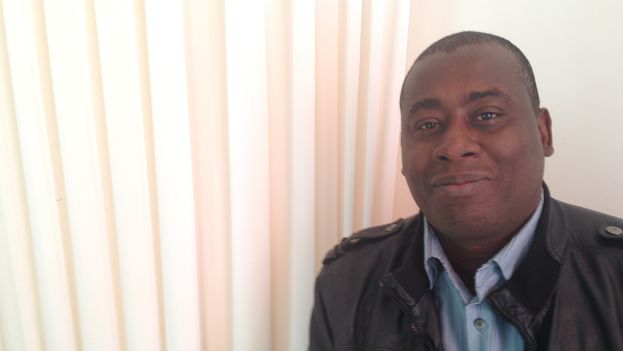
14ymedio, LILIANNE RUIZ, Havana, October 25, 2014 — On leaving prison, it took Jorge Luis Garcia Perez, known as Antunez, some time to digest that he could go where he wanted without being watched. They had held him captive for 17 years and 37 days of his life.
Just as he learned to do in jail, today he devotes his efforts to civic resistance, inspired by the doctrine of Gene Sharp and Martin Luther King. His movement gathers dozens of activists who carry out street protests and civic meetings in several provinces of the country and in his native Placetas.
Lilianne: Let’s talk about before going to prison, adolescent Antunez. What did you want to be?
Antunez: In adolescence, a firefighter. I liked the idea of rescuing people, putting out fires. But before going to prison I wanted to become a lawyer. I believe that was my calling.
Lilianne: Jail is a survival experience. Do you think it hardened you?
Antunez: The most fruitful and difficult experience, as paradoxical as it may seem, has been jail. I never could imagine that jail was going to be a hard as it was, nor that I was going to be a witness to and a victim of the vile abuses that I experienced. I do not know how to answer you if it hardened me or not. When I entered prison I had a much more radical ideology, it was less democratic. But jail, thanks to God and to a group of people whom I met, helped me to become more tolerant, more inclusive, and to respect various opinions.
As a prisoner, I went to the most severe regime in Cuba. The gloomy prison of Kilo 8 in Camaguey, commonly known as “I lost the key,” where the most sinister repressors are found. Torture forms part of the repressive mentality of the jailers in a constant and daily way. It was there where a group of us political prisoners came together and founded the Pedro Luis Boitel Political Prisoner’s Association, in order to confront repression in a civic way. Thus, I tell you that prison did not harden me, because if it had, I would have emerged with resentment, hatred, feelings of vengeance, and it was not so.
Lilianne: What is your favorite music?
Antunez: I like romantic music, Maricela, Marco Antonio Solis, Juan Gabriel. But I also enjoy jazz, although I am no expert. The music to which I always sleep is instrumental.
Lilianne: Will you share with us your personal projects?
Antunez: There is a saying according to which a man, before he dies, should plant a tree, write a book and have a child. Fortunately, there is already a book, titled Boitel Lives; CADAL published it in 2005. I have planted many trees, because I am a country peasant. I only need to have a son with the woman I love, Iris Tamara Perez Aguilera, so here I am now telling you one of my goals I am aiming for.
Lilianne: You know that a growing number of dissidents and activists have identified four consensus points. What do you think?
Antunez: I believe that they are standing demands that concern all members of the opposition and all Cubans wherever they are. I wish that more fellow countrymen would adhere to these four points. I believe that they represent the sentiment of all good Cubans: to free political prisoners, for the Cuban government to ratify the human rights agreements, recognize the legitimacy of the opposition and stop repression. Everything that is done for change, to free us from the communist dictatorship that oppresses us, is positive.
Lilianne: Why does Antunez not leave Placetas?
Antunez: Not everyone wants to go to Havana. I know many people who keep their rootedness. I would say that, more than roots, it is a spiritual necessity. I leave Placetas three or four days and I begin to feel bad. And that sensation that I have when I come up the heights, coming from Santa Clara… that is something inexplicable. The motto that I repeat, “I won’t shut up, and I’m not leaving Cuba,” means also: “I won’t shut up and I’m not leaving Placetas.”
Translated by MLK
